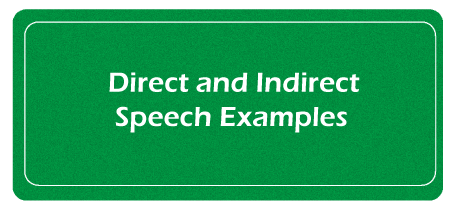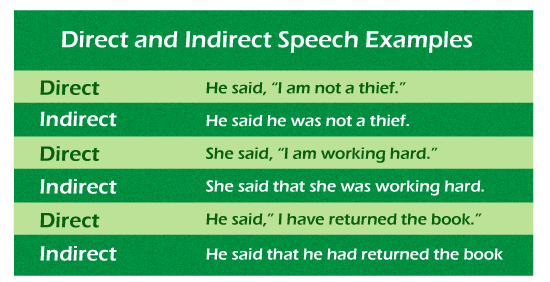Direct and Indirect Speech Examples with AnswersDirect speech is simply self-explanatory. It is a sentence or statement that reports a person's ideas, opinions and expressions precisely in their natural form. Quotation marks frequently surround it to make it clear to the reader that the quoted statement is the presenter's original narrative. 
Examples of Direct Speech
Most often, reporting verb occurs in the middle of the statement : Is it like that? He asked You do not like to stay with us ? Adverbs can be employed along with the reporting verb. This is for delineating the manner in which something is said. "I will not attend the birthday celebration," Kylie said agitatedly. "I will always make sure to help you", he said gently. Indirect speech may also be known as reported speech, indirect narrative, or indirect discourse. In grammar, indirect speech occurs when you convey somebody else's statement in your own sentences without changing the comment's meaning. Examples of Indirect Speech
Rules for Direct and Indirect NarrativesFollowing are the methods for converting Direct/Indirect Speech. Step 1: Note down the reporting verb, which is used to establish the tense of the Indirect Speech. Step 2: Adjust the place and time to match the speaker's current place and time. Step 3: Employ the appropriate pronoun for both the object and the subject. Step 4: Check that the statement has the proper structure and word arrangement 
Examples of Direct and Indirect Speech With ConversionDirect Speech: He says, "I eat 5 almonds in a day. " Direct Speech: The group said, "We go for exercise every day. " Direct Speech: My brother said, "I am baking Pizza. " Direct Speech: Marla said, "Sing with me. " Direct Speech: "Today is a bright and sunny day." said Gaurav. Direct Speech: My daughter said, "I had already taken the bag. " Direct Speech: She said, "I might arrive late. " Direct Speech: Seema said, "I am residing in London. " Direct Speech: He said, "Shall we begin? " Direct Speech: He said, "I must leave. " Direct Speech: He said, "I will be there are 3 pm. " Direct Speech: Shalini said, "I have completed the project. " Direct Speech: Aradhna said, "I can carry all the books. " Direct Speech: Reema said, "I drove the bike. " Direct Speech: Simar said to her buddies, "please have lunch with us tomorrow at 7 pm. " Direct Speech: Hari said, "I will come tomorrow. " Direct Speech: I haven't seen Jessica. So, these were the examples of direct and indirect speech. Conversion of direct to indirect speech includes change in tenses, pronouns and time expression. You'll want to utilize both direct and indirect speech on a regular basis, so be sure you're comfortable with both and can utilize them properly. Direct speech does not always accurately portray what someone has spoken. Try utilizing a verb like "to construct," "to state," or "to explain" rather than "to tell." Whereas "to say" is commonly used, you may wish to use "to tell" to express something that's been communicated to you. Also, inverted commas are usually used in case of direct speech and removed in case of indirect speech.
Next TopicDirect and Indirect Speech
|
 For Videos Join Our Youtube Channel: Join Now
For Videos Join Our Youtube Channel: Join Now
Feedback
- Send your Feedback to [email protected]
Help Others, Please Share









